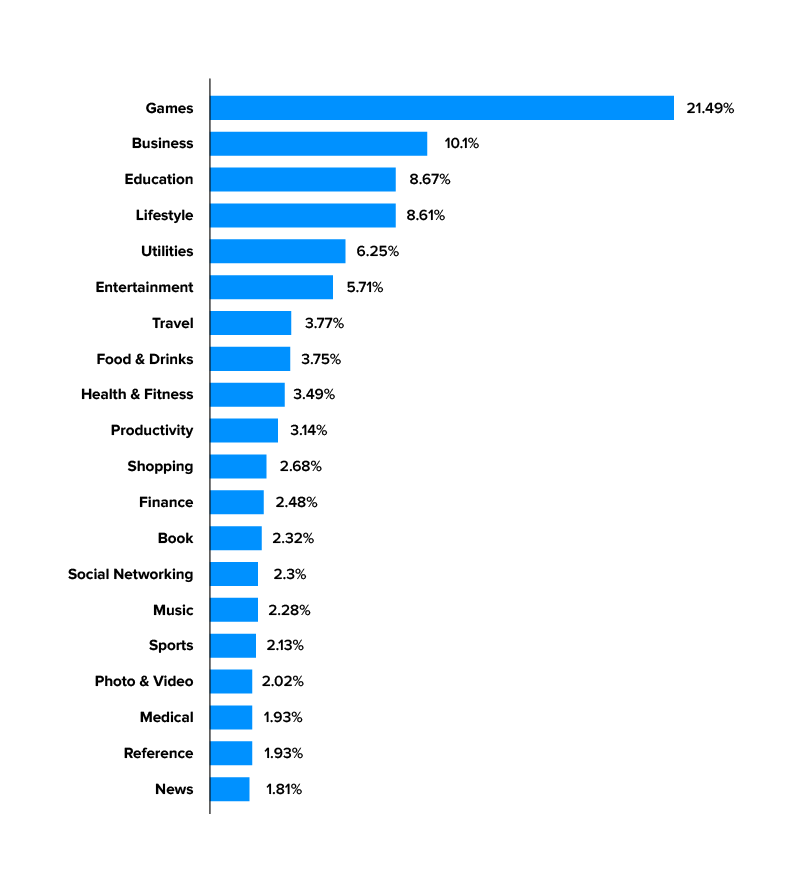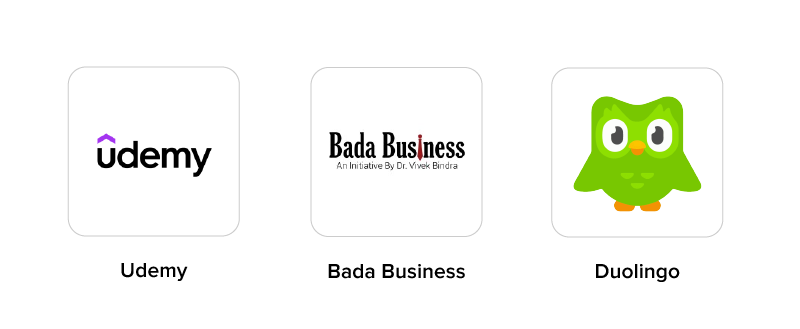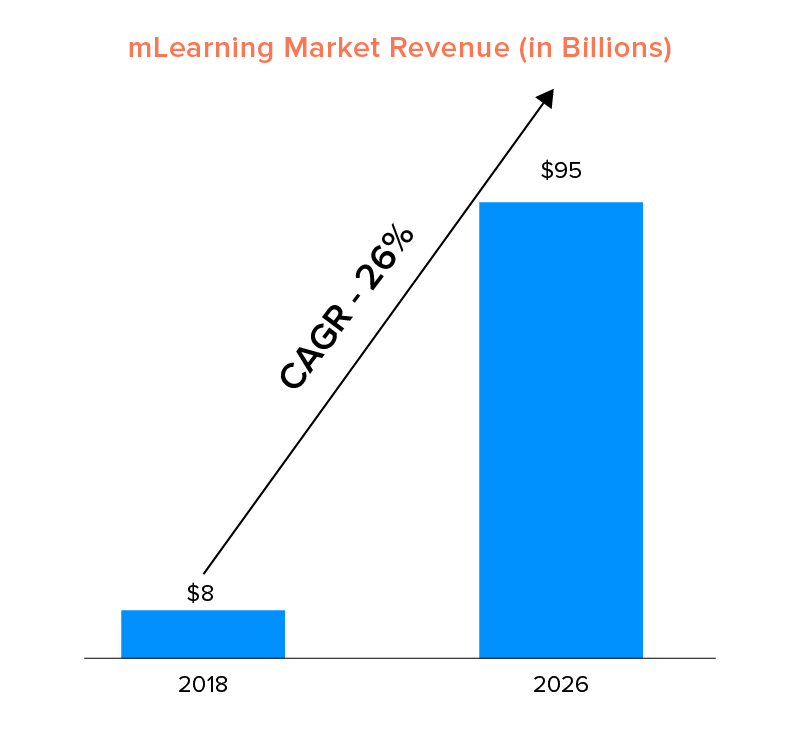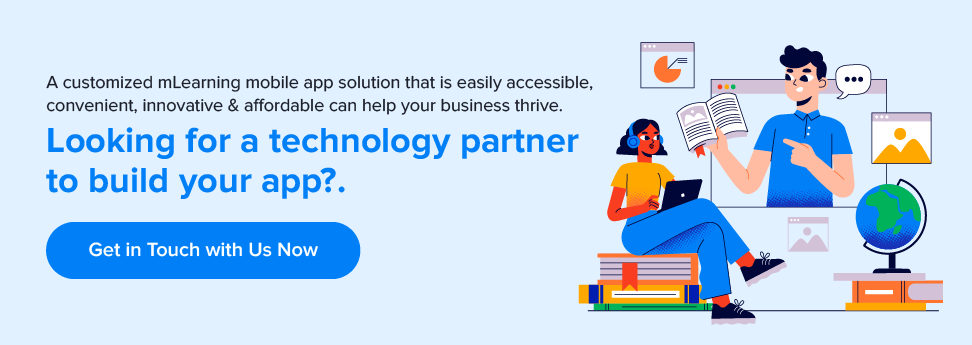Are Mobile Apps the Future of the Education Industry?
In lieu of the pandemic, the education industry has undergone a significant shift. Education is now all about creativity, connectivity and critical thinking, rather than lectures, notes and assignments.
What was once only feasible within the four walls of a classroom is now available from any location on the globe. While technology has advanced swiftly, it has only lately been fully utilised in the education field. It might be surprising to know that the education industry ranks third in the most popular mobile app category on the app store worldwide, according to Statista.

Technological advancements have made it feasible to creatively depict knowledge, making it much easier for learners to understand new concepts. Hundreds of startups have built thousands of smartphone apps that use various creative approaches to facilitate learning.
Between 2015 and 2020, the global mobile education market increased at a CAGR of roughly 24%. According to IMARC Group, the market would continue to grow strongly between 2021 and 2026.
For both those looking for ways to learn and those looking to get an online learning mobile app developed, mobile apps for education sector have emerged as the most important focus. Every part of today’s eLearning is designed with the intention of preserving the essence of information sharing and teaching. The various alternatives and module selection have helped to elevate knowledge acquisition to a new level.
Further, as an answer to the question, ‘Are mobile apps the future of Education industry?’, let us look at:
- The popular mobile apps for the Education industry
- Benefits of mobile apps in Education
- Technology trends transforming the Education sector
Popular Apps Ruling the Education Industry

Udemy
Udemy is an on-demand educational platform that offers more than 130,000 courses to users through short yet interactive videos. The app offers a variety of courses on a variety of topics. Students can find an appropriate course by looking at previous students’ ratings and feedback. The features that Udemy comes with are also the features incorporated by the best on-demand tutoring apps.
Duolingo
Duolingo, which is ranked amongst the best apps in the education category, allows users to learn over 30 popular languages in the most effective method possible. The software is absolutely free to download, and there are no hidden costs or in-app purchases with Duolingo. Students can track their progress by installing this language learning app.
Bada Business
Bada Business is an entrepreneur-training application developed with a view to make business learning mobile. The app brings extensive knowledge of the global business leaders through videos. The app also provides a platform to all the budding entrepreneurs to discuss their journey.
AppInventiv developed the app for both iOS and Android platforms, making the platform accessible to 9.6K daily active users. The result of the four months of design and development efforts resulted in an app that went on to earn 4.7 stars on both Play Store and App Store.
With this attended to, let’s turn towards understanding the benefits of education industry.
Benefits of Mobile Learning Apps
The possibility to access any material from any location at any time makes the learning process simple and convenient. In these changing times, mobile phones provide instant access to information. Hence, the rise of smart devices has sparked a mobile learning revolution. Here are some benefits of creating an mLearning app.
Learning becomes Flexible
By eliminating the need for learning to take place at a specific time and in a specific location, online learning provided flexibility. Now, educational resources such as videos, podcasts, and other multimedia formats are available on smartphones and tablets, extending learning flexibility even further. Furthermore, learners enjoy the added convenience of being able to access this content from their mobile devices at any time and from any location.
Improved Retention Rates
Learning occurs only when all course material has been completed and essential points have been remembered. Mobile learning is intended to encourage participation as the content is easier to grasp due to innovative techniques used. Also, because learners are already adapted to their devices, hence mobile learning becomes easier for students.
Using Multiple Devices
Training should be as convenient as possible. And, thanks to technological advancements, the same eLearning courses may be accessed on any device that a student would use on a regular basis, from PCs and laptops to tablets and smartphones.
Improved Performance
Students prefer learning approaches that do not interfere with their regular schedules and give easy access to information. As a result, a learning habit is formed, which helps nurture and improve performance.
Remote Access & 24×7 Availability
Another impact of mobile apps on education is offline & remote accessibility. They enable students to learn at any time and from any location on the planet. These apps allow students to pursue their interests at any time of day. Many people who enrol in such online courses are from remote areas who no longer have to worry about travelling or relocating to a different place to further their education. These educational apps also allow teachers and institutions to communicate with students all over the world.
Mobile apps for the education sector are changing the learning environment. Clear evidence of which is that the mobile learning market size is anticipated to grow from USD 8 Bn to USD 95 Bn between 2018 and 2026, with a CAGR of 26%.

Seeing these numbers, if you are looking ahead to make a perfect entry to the industry or upgrade the existing processes of your education institution, do not remain sitting on the fence. Contact the best mLearning application developers today itself!
Technology Trends Transforming the Education Sector
App-based learning is one of the most popular educational technology fads, but there’s more to it than it meets the eye. Next, we’ll discuss various innovative technologies that are deployed on the backend to make learning accessible and enjoyable for everyone.
Artificial Intelligence (AI)
Artificial Intelligence (AI) has progressively become a part of our life, whether it’s for watching TV, dating, or shopping. AI has a significant impact on mobile app development in several industries. This technology will alter the educational experience in a variety of ways. In the education market, AI technology embraces one of the most significant benefits: personalization.
Virtual Reality (VR)
The use of computer technology to create a simulated environment is known as virtual reality (VR). In the last two years, Virtual Reality (VR) has made significant progress in mobile learning and has emerged as a potent tool for online learning. Anatomyou VR, for instance, is a mobile app that educates you about human anatomy. It displays anatomical structures of various human body systems using virtual immersive 3D navigation.
Augmented Reality (AR)
AR is comparable to VR in that it simulates effects in the real world rather than building new virtual worlds. A good example is Google Translate which has the ability to translate text recorded via your camera in real time. You can play interactive learning games with students using augmented reality learning experiences. This makes training more engaging and opens up new possibilities.
Chatbots
Virtual assistants like Siri and Alexa make our lives easier, and mobile learning will become even more streamlined with their help. Voice assistants are being used by roughly 3.5 billion individuals throughout the world. There will be 8.4 billion voice assistant-enabled devices by 2024, which is more than the world’s population.
Chatbots not only provide a tailored learning environment, but they also allow lectures to be converted into chat chats. It can also be used to convert lectures into a series of messages. This game-changing technology will determine the kids’ comprehension level. In a nutshell, chatbots provide students with a tailored learning experience.
Gamification
Students may be more engaged if learning and enjoyment are combined. Gamification has the ability to make learning enjoyable, resulting in increased student engagement. Gamification is essential for improving pupils’ focus levels. As a result, we can claim that the gamification explosion will offer online learning a new edge.
Conclusion
Online education and eLearning have emerged as prominent sectors that necessitate an app interface, since the world has reached a new level of acceptance of technology-mediated activities in all fields.
A custom mobile application is the best fit for any educational organization or aspiring entrepreneur looking to go mobile with their course or eLearning module. However, creating a competitive, convenient & engaging application that makes the online learning process worthwhile and provides it an advantage over traditional approaches is a skill.
Do you already have an education app idea? Are you planning to create a unique & innovative mobile application for education? If you require guidance or technical support in order to turn your mobile app development idea into a reality, please contact us.
Frequently Asked Questions
Q. How to build a mobile learning app?
Developing a comprehensive mobile app involves the following steps:
- Know your target audience
- Choose a leading mobile app development company
- Make your app user centric
- Be sure of the features to be integrated
- Ensure technological innovation
- Keep in mind the KPIs
- Make sure your app is tested well before deployment
- Build a robust marketing strategy
Q. What is the elearning app development cost?
An educational software cost is the cost of making an MVP. The cost is determined by a number of elements, ranging from the complexity of an idea and features to be added to the location of an app development firm.
Q. Why are educational apps crucial?
The benefits of mobile apps in education are bringing a huge impact in the traditional education system by introducing the power of flexibility, personalization, and engagement into the processes. Something that is making it possible to learn even beyond the premises of schools, libraries, and other educational organizations.

strategies your digital product..




